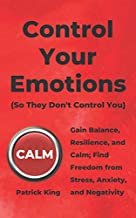Impulse Control Disorder
Specialty. Psychiatry, clinical psychology. Impulse-control disorder (ICD) is a class of psychiatric disorders characterized by impulsivity – failure to resist a temptation, an urge, or an impulse; or having the inability to not speak on a thought.
Cluster Number:
Wiki Number: W104
Diagnosis: Impulse Control Disorder
US Patients:
World Patients:
Sex Ratio:
Age Onset:
Brain Area: striatum
Symptoms: impulsivity-failure to resist a temptation, an urge, or having the inability not to speak on a thought: sexual compulsion,
Progression: internet addiction, compulsive shopping, pyromania, intermittent explosive disorder, kleptomania, trichotillomania
Causes: complications of late Parkinson’s disease, alcohol dependence, obsessive-compulsive disorder
Medications: varies by type of impulse;
Therapies: CBT, varies by type of impulse
Youtube Video: Treatment Challenges of Impulse Control Disorder
Amazon or Library Book:
Control Your Emotions
Amazon or Library Book: The Kids’ Guide to Staying Awesome
and In Control
Click the book to link or order from Amazon.
Click the book to link or order from Amazon.


